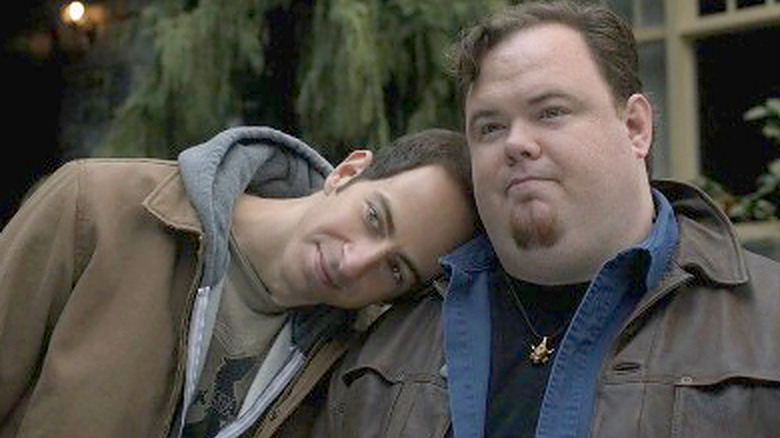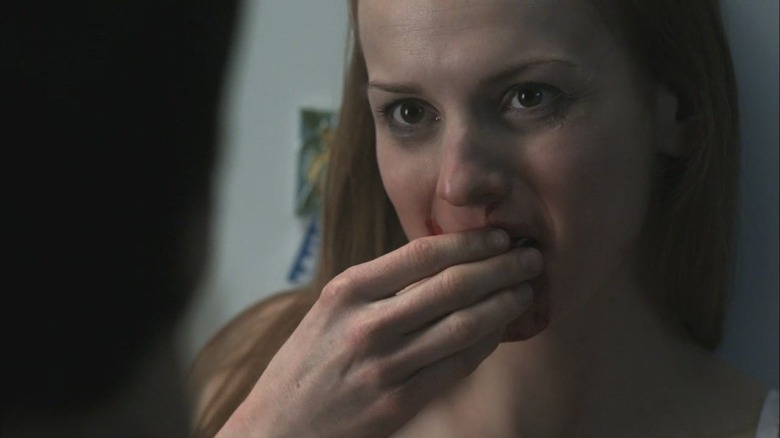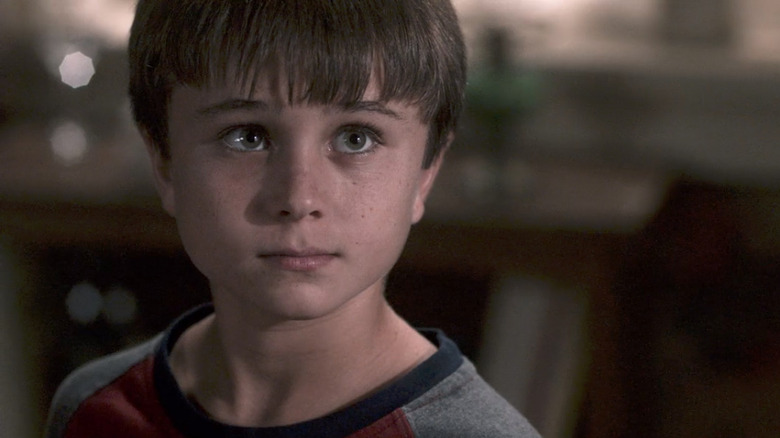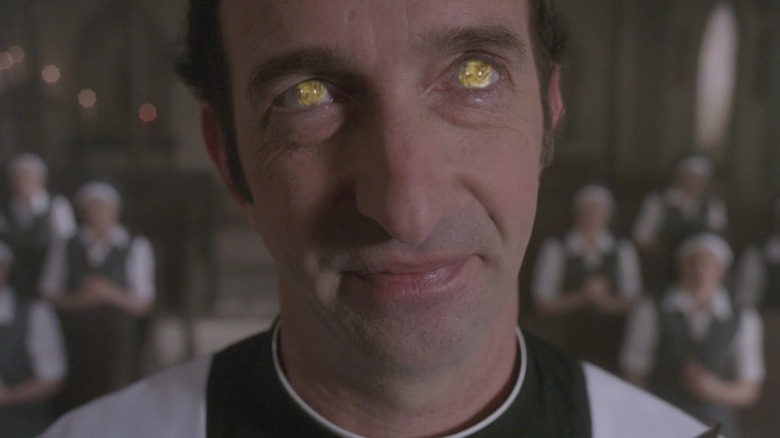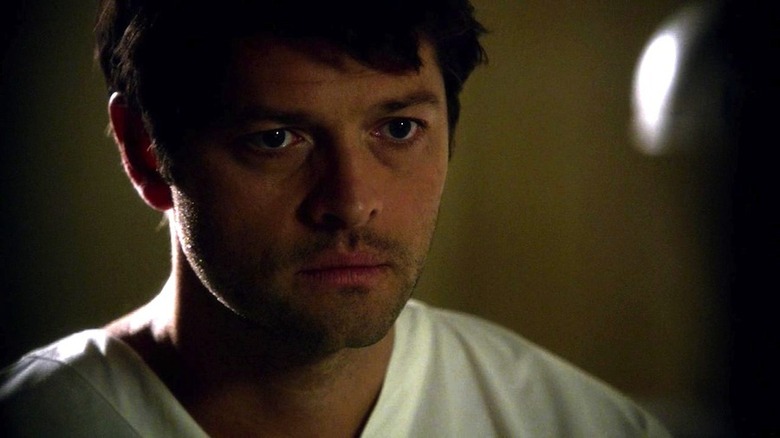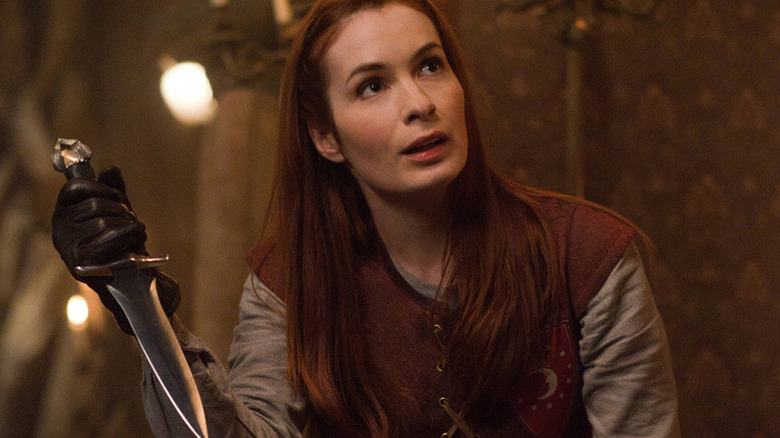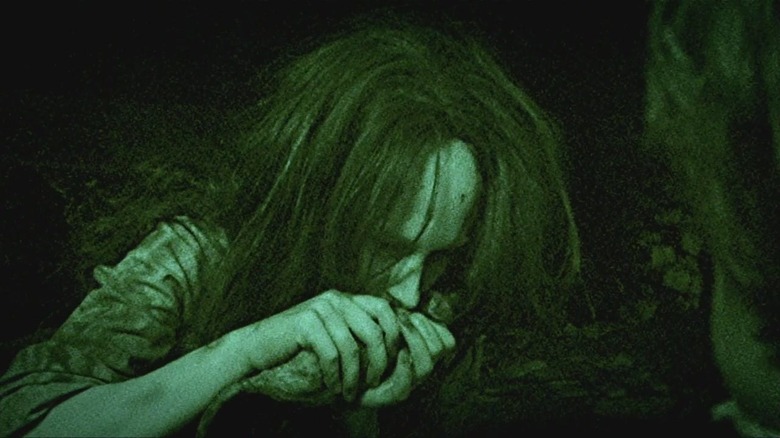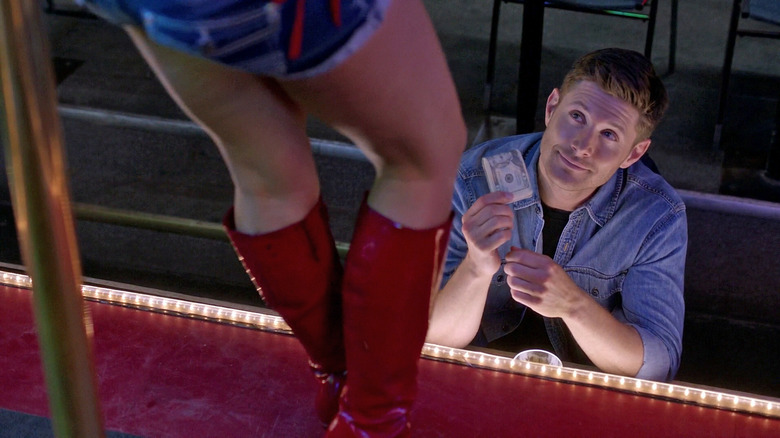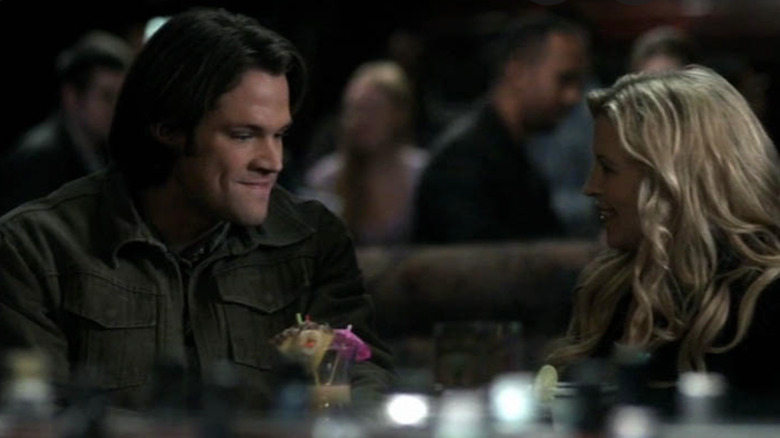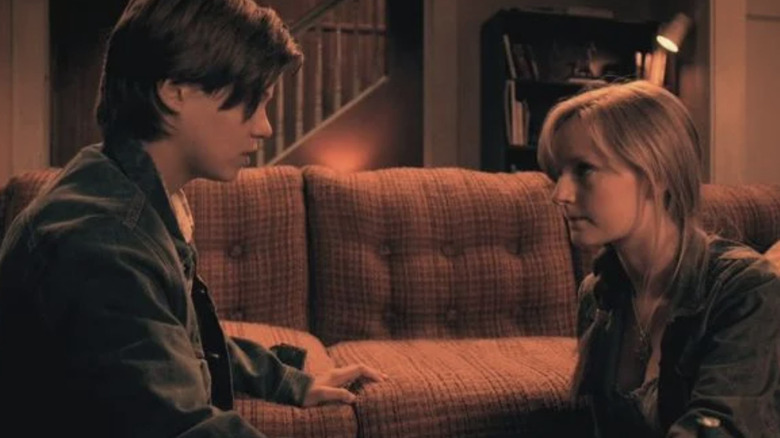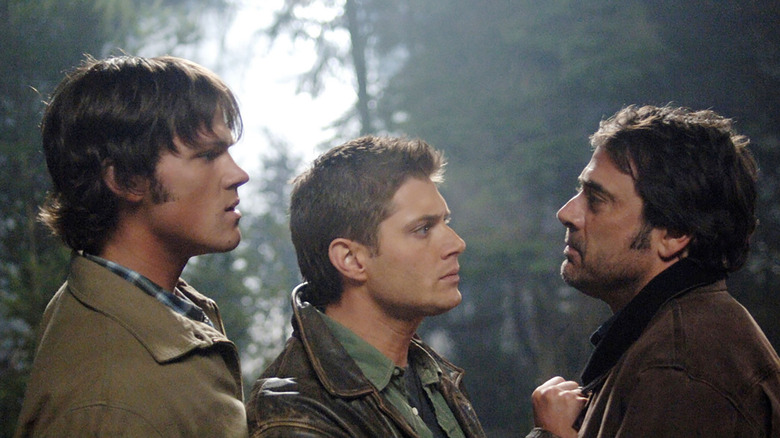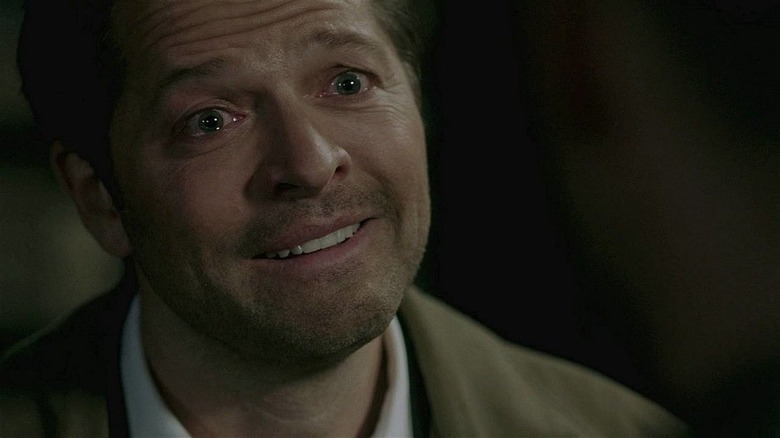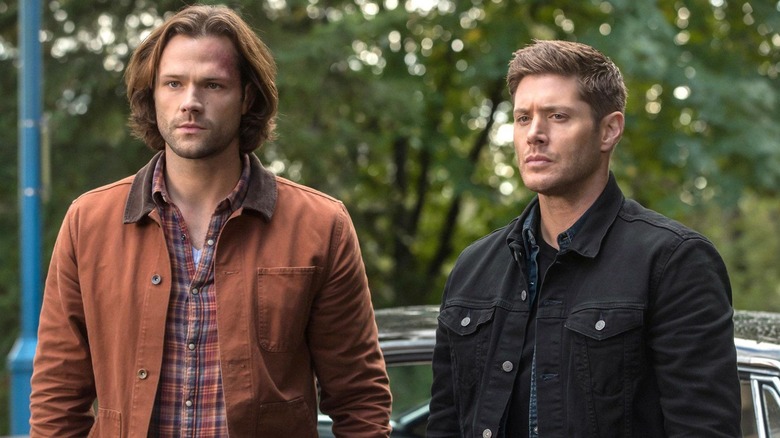Times Supernatural Went Too Far
"Supernatural" kept fans captivated upon its 2005 debut with chilling ghost stories, provocative plotlines, and the rate in which it killed off main characters — even the two leads Sam (Jared Padalecki) and Dean (Jensen Ackles). By Season 4, fans got accustomed to one of the Winchester brothers typically dying in the season finale each year, as the series got confident and bold. Some 15 seasons later, the series went off the air with a legacy that included 327 episodes and an intensely-loyal fanbase.
In its attempts to be provocative, "Supernatural" sometimes went too far in the opinions of some viewers. Whether it was social justice issues (which brought with them accusations of "queerbaiting" and lackluster LGBTQ+ representation), killing off its women (perhaps more frequently than men), or a demon killing an entire room of nuns, the show earned the ire of some fans. In some cases, the more outlandish scenes worked; other times, some viewers may have preferred to not watch a demon inseminate a woman through possession. While "Supernatural" was a landmark series, here are some specific moments from the show fans could probably have done without.
Due to the nature of certain scenes in the series, the following article contains multiple references to sexual assault, domestic violence, and mental health struggles. If you or anyone you know has been a victim of sexual assault, help is available. Visit the Rape, Abuse & Incest National Network website or contact RAINN's National Helpline at 1-800-656-HOPE (4673). If you or anyone you know is having suicidal thoughts, please call the National Suicide Prevention Lifeline at 1-800-273-TALK (8255). If you or someone you know is dealing with domestic abuse, you can call the National Domestic Violence Hotline at 1−800−799−7233. You can also find more information, resources, and support at their website.
Somewhere over the rainbow, Supernatural kills its gay characters
When it comes to LGBTQ+ representation on TV, "Supernatural" left a lot to be desired in the eyes of many fans — especially in the series' first handful of seasons. In the few times the show did offer queer characters, they tended to be riddled with stereotypes, serving as comedic tools rather than fleshed-out characters serving a purpose. For instance, in the episode "The Real Ghostbusters" (Season 5, Episode 9), we met Barnes and Damien — two gay characters who cosplay as Sam and Dean at a fan convention for the in-universe meta book series, "Supernatural."
A personification of the show's long-running gay jokes surrounding Sam and Dean (given that the good-looking brothers travel in seedy motels to hunt ghosts regularly, it's not unreasonable that some people might peg them as a couple), such incest and gay jokes were stretched to the point of exhaustion over the show's 15 seasons. But rather than counterbalance it with any actual queer representation, Barnes and Damien were presented as a cringe-worthy pair partaking in far too much PDA and uncomfortable behavior. Such decisions tended to not only leave the show's LGBTQ+ audience feeling even more out in the cold, but their cosplay as two brothers only added an uncomfortable level of taboo to one of the show's first queer couples.
Casual on-screen cannibalism
If you're ever struggling to find a sexy date night activity, why not eat the flesh of your significant other? Just take a chunk out and eat it raw ... it will be fine. The "Supernatural" episode "My Bloody Valentine" (Season 5, Episode 14) featured a couple that did exactly that, and it was every bit as horrifying as you might imagine.
Of course, the couple didn't just get a random hankering for cannibalism. This being "Supernatural" we had Famine, one of the four horsemen of the apocalypse, to thank for this gag-worthy scene.
As a whole, Season 4 marked the show's turning point from haunting ghost stories to blood, gore, and demons. Yet, despite eleven more seasons after this gruesome gem, "Valentine" still reigns supreme as the show's hardest-to-watch moment. How did this ever make it onto network TV?
This episode also hosts another scene that left fans frustrated. Up until this point, the series had presented John and Mary (the Winchesters' parents) as hopelessly in love. However, the episode's boundary-breaking Cupid retcons the show's origin story — and the heart of the series — by taking credit for their love story and claiming they hated each other, until a friendly little arrow changed the course of the entire universe. Can we get a refund on this episode?
Demons need a consent seminar
No one ever woke up on a Thursday morning and thought: "You know what's missing on TV? Metaphysical demon rape." Nevertheless, in "I Believe Children Are Our Future" (Season 5, Episode 6), the show's typical hijinks are taken about ten steps too far when a demon immaculately impregnates a virgin to create the Antichrist — an all-powerful child with the ability to stop (or start) an apocalypse. Fans are subjected to flashback scenes where the possessed mother gives a tortured (forced) birth, fighting off the demon inside her.
It's disturbing enough when demons use their human hosts to have sex; the show has established that when possessed, a person can feel and see everything the demon is doing to their body — including using it for sex without your consent. So, humans are essentially forced to watch a demon use their body for sex, murder, and other creepy demon things while they have no way to turn off their awareness. If that wasn't bad enough, demons allow humans to make deals to force someone to fall in love with them.
Ultimately, the child chooses to flee, to prevent being used as a pawn. Yet, despite being one of the most powerful beings in the show, we never hear from him again. So why, exactly, were we subjected to this hard-to-watch scene?
Azazel massacres some nuns
"Supernatural" never shied away from getting sacrilegious at times (okay, most of the time). In "Lucifer Rising" (Season 4, Episode 22), our favorite yellow-eyed demon Azazel possesses a priest and kills an entire church of nuns. Kids, don't watch this in front of your religious grandparents.
The scene may be epic, but it's also a lot to absorb. Yellow-Eyes even boasts "Exorcist"-adjacent lines like, "Shut your friggen piehole, you little slut" before papa Lucifer feasts on their pure souls from lockup. While we don't see Azazel physically murder the nuns, we hear their screams. Later, Azazel's religious garb is drenched in blood while he's surrounded by the bodies of dead nuns. Naturally, he makes a collect call to daddy Satan using a nun's dead body.
Creator Eric Kripke's opinion on the scene matches Ruby's amusement when she makes the joke, "What's black and white and red all over?" As it turns out, these sequences were almost more graphic. In the episode's commentary, Kripke explained: "We had a lot of discussion early on about how much we could terrorize these nuns — how hardcore we could get with this."
After mentioning the slut line, Kripke added, "Later on, in one of the drafts of the script, I crucified a nun and had her kind of bleeding down an upside-down cross and, you know, Bob Singer came into my office, and he said, 'You know Eric, I rarely say this, but you're going way too far.' And I said, 'Well, you know, nun violence is the last great frontier for us on 'Supernatural.'"
As a result, Kripke took most of the nun violence off-camera. He also noted that director of photography Serge Ladouceur would frequently say, "Well, we are all going to hell." Kripke would joke back, "I'm Sorry, Serge! I'm Jewish. I don't have an ear for this kind of sacrilegiousness that everyone else seems to have." And "Supernatural" just wouldn't be the same if he did.
Making a mockery of mental health
Mental health struggles are no joke, but that doesn't stop "Supernatural" and its characters from flirting with the demonization of therapy; in the eyes of some, the show sometimes made a mockery of mental illnesses, with characters pretending to be "crazy" for their own ends. Things went from bad to worse with the episode "Sam, Interrupted" (Season 5, Episode 11) — a play on the Angelina Jolie film "Girl, Interrupted" — that featured Castiel (Misha Collins). Taking things even further than Dean comments like "Chicks are crazy," the characters infiltrated a psych ward populated by a myriad of mental health stereotypes.
To get admitted to the psych ward, Sam tells the doctor the truth about starting the apocalypse, to mimic a psychotic episode. The most egregious moment, however, might be when Dean pulls down his pants and acts "crazy." It's meant to be funny, and while many fans categorize it as such, it could also be seen as feeding into damaging stereotypes and making light of genuine difficulties faced by those with mental illness.
Charlie deserves better
In "Dark Dynasty" (Season 10, Episode 21), writers did what fans always knew was an inevitability: kill off Charlie. While some fans were furious that another woman (especially the show's only proper queer representation) bit the dust to further the plot, others made excuses. Sure, "Supernatural" kills off its characters of all ilk, but look at how long the women last compared to the men.
Her death was disappointing in that it served no purpose for her storyline, seemingly existing purely to be a catalyst for Dean to go off the deep end. Charlie deserved better — as did the show's largely women and queer fanbase.
Characters like Garth managed to avoid dying in the series, despite monstrous tendencies. If the series could find a way to keep a werewolf alive, it seemed, there was no reason Charlie had to die a bloody bathtub death. All she wanted to do was hook up with hot fairies, play RPG, and ... y'know ... hack some credit card companies.
More casual incest
Ah, yes. More incest — just what the dread doctor ordered. "Family Remains" (Season 4, Episode 11) wasn't the first time humans were the actual monsters, but it did take the people-hunting concept of the "The Benders" (Season 1, Episode 15) and dial things up to 11.
Early in "Family Remains," the Winchesters realize that what they thought was a haunting is actually a pair of neglected and deranged siblings living in the walls of the Carter house. Rebecca, Dean and Sam's original suspect, dead by suicide after her father repeatedly raped her, produced two children that he locked up to hide his sins.
While this was a devastating turn of events, given what seemed like a run of the mill haunting, despite acknowledging the horrors of the daughter's situation, Dean still made jokes like: "The daddy was the baby daddy too" and "She ganks dear old dad ... and granddad."
The episode was a lot to process. First, there was the depiction of teenagers under deplorable conditions, spending their lives locked up in a tiny crawl space — touch-starved, uneducated, and barely fed — who must die because a monster turned them into little more than territorial animals. There was only one monster in the episode, however, and it was Bill Gibson (Gerry Rousseau).
Could viewers have done without the scene where the girl eats a live rat? While it shows how bad things got for these characters, some may argue it was bit gratuitous.
Dean is kind of predatory
Dean Winchester is a contradictory enigma. Between his unaddressed, occasionally-implied attraction toward men (and subsequent possible internalized homophobia) and his aggressive pursuit of women, he displays some toxic behavior. In the sex scenes we've seen with Dean, he tends to be a pretty gentle lover despite his bravado, but the methods he uses to get women into bed could be interpreted as predatory, perhaps even bordering on rape.
We mostly see Dean's hookups with women he has a history or a connection with play out onscreen. But, what happens after he gets a woman drunk before a hookup? What happens when he trolls a bar during Valentine's Day — or what he calls "Unattached Drifter Christmas" — and intentionally preys on desperate, lonely women? In the eyes of some, the concerning parts of these scenes are what is never shown on camera.
Whether Dean is deliberately seeking out women with daddy issues or hitting on cheerleaders still in high school, he really needs to sit down and examine himself — and his behavior — because he frequently veers awfully close to being a predator.
Kids, don't body-swap with an adult
Fans clamored for a body-swap episode between Dean and Sam for years, but what they got instead was an awkward mess of an episode called "Swap Meat" (Season 5, Episode 12). Instead of the delightful hijinks that should have ensued had Dean and Sam swapped bodies, fans were subjected instead to a cloying teenager named Gary, who used witchcraft to switch bodies with the ever-hunky Sam Winchester.
There are some intrinsically cringey connotations when it comes to an underaged teenager having the body of a grown man. But things got dark when Gary (using Sam's body) went to a bar and proceeded to (poorly) pick up a woman. The consent in this situation was off-the-charts not okay — calling to mind situations of statutory rape, and the woman having relations with someone under dangerously misleading circumstances.
To boot, Gary played around with Sam's body in a way he didn't consent to, making him no better than a frisky demon using his body like a motel. The whole episode felt like the worst parts of '80s movies like "Big," "Zapped!" "Revenge of the Nerds" and others, combined into one painfully-outdated take on the fantasy of having someone else's hot bod as your own personal playground.
Murdering a desperate mom
In Season 2, Dean learns a valuable lesson: Not all monsters are evil.
The "vegetarian" vampire nest led by the ever-sweet vampire Lenore in "Bloodlust"(Season 2, Episode 3) teaches Dean that just because life hands someone a raw supernatural deal doesn't mean they have to become evil. Yet despite this hard-earned lesson, we constantly see that enlightenment retconned. Sure something always prompts Dean to re-learn what he magically forgets. But for that to happen, good monsters have to die — like Sam's kitsune friend Amy Pond in the Season 7 episode "The Girl Next Door."
Because he's in a bad mood, Dean decides to kill a grown-up Amy who begins killing people when her son is sick and dying. This comes after years of working in a morgue to get her and her son sustenance from dead bodies rather than harming anyone. Her son was better and her kills stopped, but the writers completely retcon Dean's monster-related growth to spark the catalyst that drives a wedge between the Winchesters.
Despite Dean's claimed reasoning that killing makes someone a monster, he does the same thing, all while creating another vengeance-seeking monster — her son — in the process. To make matters worse, just one season later, Dean befriends a vampire.
Daddy dearest
John Winchester is definitely not winning any Best TV Dad awards, and would have to shop at Spencer Gifts for his own "World's Best Dad" mug because his boys sure aren't getting one for him.
Okay, he had a rough deal. Azazel leaves his young kids without a mom and him without a wife. But rather than moving, enrolling his young children in school, and maybe consulting a therapist for the trauma he just witnessed, John decides to go on a revenge spree against Yellow-Eyes — with his children in tow.
They go from motel room to motel room, never staying in a place long enough to make many human connections, all while being trained as ghost hunting soldiers before they reach double digits. The level of severe trauma John puts them through at such a young age is precisely why his sons are so co-dependent and reckless about their lives as adults. Their father teaches them that their lives are meaningless without hunting, after all.
In addition to leaving his young kids for weeks on end with little supplies or money, their neglected childhood particularly stands out in "Bad Boys" (Season 9, Episode 7). In it, we learn that Dean's happiest moment as a kid was when his dad sent him to a group home, giving him the most stability he'd ever had.
In such moments, you can't help but sympathize with John. Yet, many scenes heavily imply that he was physically abusive, too. He may have done his "best," but this was made even more gut-wrenching when Dean and Sam went back in time, and John was horrified to learn that a father would do this to their children.
Bury your gays in the arms of an angel
Unfortunately for Castiel fans, the fallen angel has died more than a few times; despite such frequency, it never gets any easier. However, the most gut-wrenching of these deaths comes near the ending of "Supernatural" in "Despair" (Season 15, Episode 18). Both his final death and his final on-screen moment in the series, it also carried with it much darker connotations.
Immediately after "Supernatural" introduced Castiel in Season 4, fans began clamoring for Dean and Castiel to get together. At first, this may have been a desire to embrace the "enemies to lovers" trope, perhaps with a dash of wishful thinking. As it became apparent that a significant part of the fandom was pulling for this, the writers seemingly began adding scenes laced with subtle sexual tension and romantic undertones. Between unending thousand-yard stares, deeply emotional scenes bordering on love confessions, and grief over their respective deaths that mimicked spousal tragedy, it became hard to deny that hints were being dropped that indicated something more than brotherhood.
"Despair" seemingly canonized that non-platonic love, at least on behalf of Castiel. Due to his deal with the Empty, he'd only get taken during a moment of true happiness. So, what is Castiel's ideal instance of bliss? Telling Dean he loves him. Just ask Angel and Buffy: no one's moment of true happiness comes from loving their bestie. Cas has platonically said he loves people before, so clearly this was different.
But, playing right into the hands of the "bury your gays" critique, Castiel then died. Actor Misha Collins has called the moment a "homosexual declaration of love," one in which Dean's feelings on the matter remained entirely unaddressed outside a look in heaven when he discovered that Jack rescued Cas off-screen. The entire matter was made all the more frustrating because of how awkwardly the aftermath was handled.
Constantly choosing death over loss
How often can two leads of a show sacrifice themselves for each other before it becomes obnoxiously repetitive and they finally get some therapy? Sure, the first few times the brothers died to save the other one were heartbreaking, but after 15 seasons it got really old.
Even when the Winchester brothers acknowledged their codependency (spurred on by their father's frequent abandonment), they would immediately ditch any character growth by the next season's start. In fact, they only seemed to truly cut it out twice in the entire show.
After Dean was sent to purgatory, Sam went too far in the other direction of indifference, settling down into a bizarre relationship with a woman named Amy. Hiding who he was, he carried on as a normal man, being dishonest about his past. When Dean escaped, he was not thrilled.
Then there was Dean's death in the series finale "Carry On" (Season 15, Episode 15), where he once again acknowledged their toxic co-dependency, begging Sam to let him die — for real this time — and lead an amazing life on his own. He did, and we were rewarded with a montage of Sam grieving Dean alone in the Impala. It was an impactful conclusion to the series, but once again perhaps went a bit too far.

